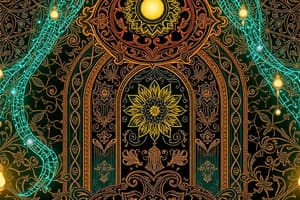Podcast
Questions and Answers
What is the outermost electron configuration of titanium?
What is the outermost electron configuration of titanium?
- 3d3 4s2
- 3d1 4s2 (correct)
- 3d7 4s2
- 3d5 4s2
Which element has the electron configuration 3d5 4s2?
Which element has the electron configuration 3d5 4s2?
- Iron (Z=26)
- Manganese (Z=25)
- Vanadium (Z=23) (correct)
- Chromium (Z=24)
What is the maximum number of electrons permissible in the d orbitals?
What is the maximum number of electrons permissible in the d orbitals?
- 10 (correct)
- 6
- 12
- 8
What is the electron configuration of copper (Z=29)?
What is the electron configuration of copper (Z=29)?
Which element has the electron configuration 3d6 4s2?
Which element has the electron configuration 3d6 4s2?
Which of the following elements has a partly filled d subshell?
Which of the following elements has a partly filled d subshell?
What is the maximum permissible number of electrons in the 4d subshell?
What is the maximum permissible number of electrons in the 4d subshell?
Which element is excluded from the Second transition series based on the definition of d block elements?
Which element is excluded from the Second transition series based on the definition of d block elements?
What is the starting element of the Third transition series?
What is the starting element of the Third transition series?
What plays a significant role in determining the anomalous configurations of some elements?
What plays a significant role in determining the anomalous configurations of some elements?
What is the principal oxidation state of lanthanides such as La, Gd, and Lu?
What is the principal oxidation state of lanthanides such as La, Gd, and Lu?
What happens to the size of M^{3+} cations in the lanthanide series?
What happens to the size of M^{3+} cations in the lanthanide series?
What is the main cause of the color exhibited by some trivalent lanthanide ions in the solid state and aqueous solution?
What is the main cause of the color exhibited by some trivalent lanthanide ions in the solid state and aqueous solution?
Which oxidation state(s) do some lanthanides exhibit in addition to the +3 state to attain stable configurations?
Which oxidation state(s) do some lanthanides exhibit in addition to the +3 state to attain stable configurations?
What is another name for the elements which have partly filled (n-2) f-orbitals?
What is another name for the elements which have partly filled (n-2) f-orbitals?
Which series of inner transition elements consists of 4f-block elements?
Which series of inner transition elements consists of 4f-block elements?
What is the principal source of lanthanides?
What is the principal source of lanthanides?
Which element has the electronic configuration [Xe] 4f^{3}5d^{0}6s^{2}?
Which element has the electronic configuration [Xe] 4f^{3}5d^{0}6s^{2}?
Why do the lanthanide elements show close similarity?
Why do the lanthanide elements show close similarity?
Flashcards are hidden until you start studying
Study Notes
Electron Configuration of Transition Elements
- Titanium's outermost electron configuration is not specified in the given text.
- The element with the electron configuration 3d5 4s2 is Manganese (Mn).
- The maximum number of electrons permissible in the d orbitals is 10.
Electron Configuration of Copper and Other Elements
- The electron configuration of copper (Z=29) is 3d10 4s1.
- The element with the electron configuration 3d6 4s2 is Iron (Fe).
d Block Elements
- Elements with a partly filled d subshell belong to the d block.
- The maximum permissible number of electrons in the 4d subshell is 10.
- Zinc (Zn) is excluded from the Second transition series based on the definition of d block elements.
Third Transition Series
- The starting element of the Third transition series is Lanthanum (La).
Anomalous Configurations
- Relativistic effects play a significant role in determining the anomalous configurations of some elements.
Lanthanides
- The principal oxidation state of lanthanides such as La, Gd, and Lu is +3.
- The size of M^{3+} cations decreases in the lanthanide series.
- The main cause of the color exhibited by some trivalent lanthanide ions in the solid state and aqueous solution is the absorption of light in the visible region.
- Some lanthanides exhibit oxidation states +2 or +4 in addition to the +3 state to attain stable configurations.
- Lanthanides are also known as the "rare earth" elements.
- The 4f-block elements comprise the Lanthanide series.
Occurrence of Lanthanides
- The principal source of lanthanides is the minerals of the rare earth group.
Electronic Configuration
- Lanthanum (La) has the electronic configuration [Xe] 4f^{3}5d^{0}6s^{2}.
- The lanthanide elements show close similarity due to the similarity in their electronic configurations.
Studying That Suits You
Use AI to generate personalized quizzes and flashcards to suit your learning preferences.




